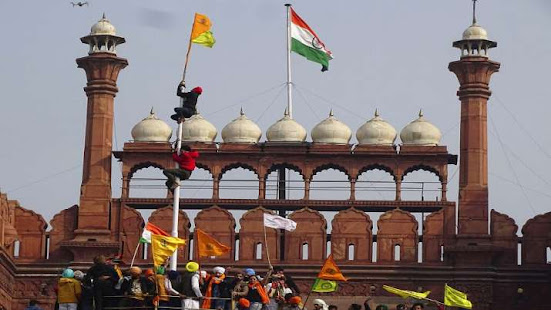Talk about the separatist lobby in Kashmir gradually losing their mojo and becoming irrelevant in the larger scheme of things! The current scenario reflects a conspicuous representation of the same.
Oddly enough, despite having tasted electoral success in the District Development Council (DDC) elections - the first-ever democratic exercise post the abolition of Article 370 and 35A and bifurcation of the erstwhile state of Jammu and Kashmir - there has hardly been any resuscitation of the wily secessionist agenda which the mainstream separatist politicians in Kashmir have been running overtly and covertly for years.
One could attribute this oddness to a host of factors but arguably one of the biggest factors is the clarity and efficacy with which the Modi government has approached its Kashmir policy in the last two years, giving a clear-cut answer to detractors and antagonists.

image source : peoplesreview.in
In his address to the Parliament earlier in February, National Conference Chairman and Lok Sabha MP Farooq Abdullah invoked Nehru and Patel while playing the Muslim card like a broken record and condemning the scrapping of J&K’s special status as an effort to estrange Kashmir’s majority Muslim community. Abdullah’s rant was a reiteration of duplicity which India has witnessed for decades - stating how “faithful” and “loyal” the NC and other Kashmiri political birds of the same feather are to the Union of India.
However, his speech reeked of the desperation of a stalwart Kashmiri political leader who has now reduced to a shadow of his former self, sending out a strong impression those in the valley with separatist and anti-establishment leanings have resigned to the fact that the times of treating Kashmir as a cottage industry to ensure its delineation from the rest of India are long gone.
 |
| image source : greaterkashmir.com |
The Modi government and those working towards the nationalistic cause can take heart from the fact that even after managing 110 seats in the DDC polls as against the BJP’s 75 although the former failed to cross the halfway mark of 140, the People’s Alliance for Gupkar Declaration (PAGD) looks lacklustre and deterred by the manner in which J&K is amalgamating with the Indian mainstream in this new chapter in the region’s modern history.
NC, which is the principal party in the Gupkar alliance, and other frontline players such as the PDP are languishing in the same old boat of separatism while masquerading as political parties pledged to the Indian constitution, without having a fresh narrative to offer to their voter base in Kashmir.
The alliance has turned itself into a bunch of cats on a hot tin roof, whose anxiety to maintain political relevance is easy to gauge. In the absence of a new blueprint, the alliance is having to resort to the old tricks in the book which have become obsolete in the Modi era. It is fair to argue, therefore, that despite having consolidated themselves as a unit and done reasonably well in the DDC polls, the Gupkar lobby is at its weakest today.
If the current scheme of things does not beckon the advent of a new era in J&K's political landscape ensuring unadulterated allegiance to the Indian Constitution, it is difficult to tell what does. If this does not infer that the Modi government’s renewed Kashmir policy after the abrogation of Article 370 is slowly but steadily reaping the desired harvest, it is difficult to tell what does.
The restoration of 4G internet services in all parts of J&K and the passing of the Jammu and Kashmir Reorganisation (Amendment) Bill 2021 in February, which brings around 170 central laws in the UT, are developments that demonstrate the return of not just political normalcy in the region but also stability in a holistic sense.
Speaking in favour of the bill in Lok Sabha, Home Minister Amit Shah reiterated and reassured in unambiguous terms that the government was committed to restoring J&K’s full statehood “at an appropriate time”. Shah made it abundantly clear, as he and PM Modi always have, that the union territory status of J&K is temporary and the region will return to its earlier status of a state once the government is convinced of a conducive and harmonious atmosphere in Kashmir.
Delimitation and resentment among separatist Kashmiri leaders
NC’s refusal to associate with the Delimitation Commission hints at the broader strategy of the Gupkar lobby to create roadblocks in process of J&K’s political recovery. In February, NC Members of Parliament - Farooq Abdullah, Muhammad Akbar Lone and Hasnain Masoodi informed the Delimitation Commission about their inability to be a part of the commission and urged against the delimitation exercise, as the J&K Reorganization Act 2019 is under judicial scrutiny in the Supreme Court of India.
Delimitation has been high on the agenda for a long time as far as the Modi government is concerned and for the right reasons. It is an exercise that is imperative to put an end to years of dichotomy in political representation between Jammu and Kashmir wherein the former has perennially been treated as the lesser, with its seat share almost always less than its share of population and electorate. All the chief ministers in the erstwhile state of J&K, barring Ghulam Nabi Azad, have been Kashmiri-speaking Muslims belonging to Kashmir.
Through delimitation, the government hopes to address longstanding concerns about Jammu’s political underrepresentation and guarantee adequate representation to Scheduled Castes (SCs) and Scheduled Tribes (STs). An increase in the number of assembly constituencies, the introduction of reservation for STs, the extension of the right to vote in assembly elections to West Pakistan refugees in the region and border alterations have led to the indispensability of a timely delimitation.
Delimitation will ensure that the regions of Jammu and Kashmir attain political parity. Naturally, the idea of delimitation does not go down well with the Muslim-majority separatist political fraternity in Kashmir and hence the resentment.
But despite the clarity of purpose in the government’s J&K roadmap -
there seems to be a growing trend of pessimism and mistrust regarding the same among a section of cynics and skeptics in India’s nationalistic circles, not just within the lobby and the united political opposition. This sudden surge in dislike for the Modi government’s Kashmir blueprint, particularly among Kashmiri nationalists who have adopted a critical tone against the administration’s approach, is misplaced.
This is the time for Kashmiri nationalists and nationalists spread across India and everywhere in the world to repose faith in Modi’s Kashmir vision, although with constructive criticism wherever necessary. However, reckless and unwarranted criticism unleashed by nationalists will only play into the hands of the pseudo-secular lobby who lick their lips at any opportunity of creating rift and confusion among the ones devoted to Indian nationalism.














